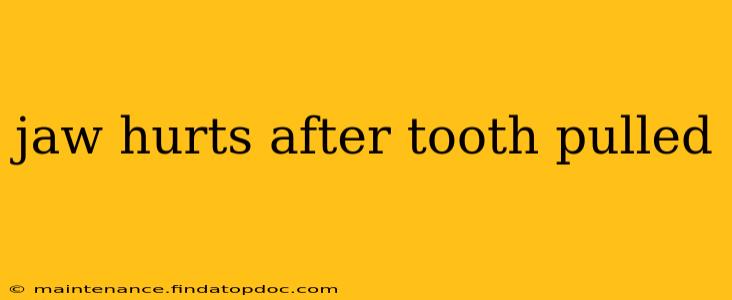Having a tooth pulled is a common procedure, but it's often followed by some level of discomfort. While some soreness is expected, significant jaw pain after a tooth extraction warrants attention. This comprehensive guide will delve into the causes, management, and prevention of jaw pain following tooth removal. We'll also address some frequently asked questions surrounding this common post-operative experience.
Why Does My Jaw Hurt After a Tooth Extraction?
Post-extraction jaw pain stems from several factors, all related to the surgical trauma of tooth removal:
- Inflammation: The body's natural inflammatory response to the wound site is a primary contributor. This inflammation causes swelling and pressure, leading to pain, particularly in the jaw.
- Nerve Irritation: The extraction process can sometimes irritate nearby nerves, resulting in localized or radiating pain. This is more likely with complex extractions or those involving impacted teeth.
- Muscle Soreness: During the procedure, you may unconsciously tense your jaw muscles. This can lead to post-operative muscle soreness and stiffness, adding to the overall pain.
- Dry Socket: This painful complication arises when the blood clot protecting the extraction site dislodges or dissolves prematurely. The exposed bone and nerve endings are highly sensitive, causing severe, throbbing pain that can radiate to the jaw. This is less common but more serious.
- Sinus Involvement: Upper molar extractions can sometimes cause pain in the sinuses due to their proximity. This is because the roots of upper molars can be close to the maxillary sinus.
How Long Does Jaw Pain After Tooth Extraction Last?
The duration of jaw pain varies significantly depending on the complexity of the extraction, individual healing responses, and adherence to post-operative instructions. Mild soreness typically lasts for a few days, gradually subsiding over a week. However, more intense pain or pain persisting beyond a week requires a check-up with your dentist or oral surgeon.
What Can I Do to Relieve Jaw Pain After Tooth Extraction?
Effective pain management is crucial for a comfortable recovery. Here’s what you can do:
- Over-the-Counter Pain Medication: Ibuprofen or acetaminophen can effectively manage mild to moderate pain. Always follow the recommended dosage.
- Ice Packs: Applying ice packs to the affected area for 15-20 minutes at a time, several times a day, can help reduce swelling and numb the pain.
- Rest: Avoid strenuous activities and get plenty of rest to aid healing.
- Gentle Rinsing: Gently rinse your mouth with salt water several times a day to keep the area clean and promote healing. Avoid forceful rinsing or spitting.
- Soft Foods: Stick to a soft food diet for the first few days to avoid irritating the extraction site.
- Avoid Smoking and Alcohol: These substances hinder healing and can increase the risk of complications like dry socket.
Is Jaw Pain After a Tooth Extraction Normal?
Yes, some degree of jaw pain is considered normal after a tooth extraction. However, the intensity and duration of the pain are key indicators of whether it's within the expected range. Severe, persistent pain, or pain accompanied by other symptoms such as fever or excessive swelling, is not normal and requires immediate professional attention.
When Should I See a Dentist After a Tooth Extraction?
Seek immediate dental attention if you experience:
- Severe, persistent pain: Pain that doesn't respond to over-the-counter pain medication.
- Excessive bleeding: Bleeding that doesn't stop after applying steady pressure for 30-45 minutes.
- Signs of infection: Fever, swelling, redness, or pus at the extraction site.
- Dry socket symptoms: Severe, throbbing pain several days after the extraction.
Regular follow-up appointments as recommended by your dentist are also important to monitor healing progress.
Can I Exercise After a Tooth Extraction?
Strenuous exercise should be avoided for at least a few days after a tooth extraction to minimize the risk of dislodging the blood clot and causing bleeding or dry socket. Light exercise can usually be resumed after a few days, but always listen to your body and stop if you experience pain.
By following these guidelines and seeking professional advice when necessary, you can manage post-extraction jaw pain effectively and ensure a smooth recovery. Remember, every individual heals differently; don't hesitate to contact your dentist or oral surgeon if you have any concerns.
